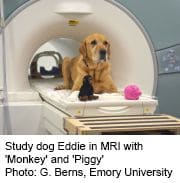- Could Your Grocery Store Meat Be Causing Recurring UTIs?
- Are You Making This Expensive Thermostat Error This Winter?
- Recognizing the Signs of Hypothyroidism
- 10 Strategies to Overcome Insomnia
- Could Artificial Sweeteners Be Aging the Brain Faster?
- Techniques for Soothing Your Nervous System
- Does the Water in Your House Smell Funny? Here’s Why
- Can a Daily Dose of Apple Cider Vinegar Actually Aid Weight Loss?
- 6 Health Beverages That Can Actually Spike Your Blood Sugar
- Treatment Options for Social Anxiety Disorder
Does Your Dog Really Understand You?

Many dogs perk up at certain words, like “treat” or “squirrel.” But does Buddy really understand what you’re saying, or is he simply reacting to the excitement in your voice?
Researchers at Emory University in Atlanta might have some answers. In a study of 12 dogs, the investigators say they’ve dug up some new details about how pooches process words.
“Many dog owners think that their dogs know what some words mean, but there really isn’t much scientific evidence to support that,” said study first author Ashley Prichard, a Ph.D. candidate in psychology. “We wanted to get data from the dogs themselves — not just owner reports.”
The study included various breeds. The dogs were trained for months by their owners to retrieve two different objects when told the objects’ names — “Monkey” and “Piggy.” One was a soft toy, the other a hard one.
The dogs underwent brain scans while their owners first presented the toys and said the toys’ names. The owners then held up new objects and said nonsense words.
The dogs showed greater activation in the sound-processing (auditory) regions of the brain in response to the new nonsense words than to the words they were trained to recognize, the researchers found.
“We expected to see that dogs neurally discriminate between words that they know and words that they don’t,” Prichard said in a university news release.
“What’s surprising is that the result is opposite to that of research on humans — people typically show greater neural activation for known words than novel words,” she noted.
The dogs may show greater brain activity in response to a new word because they sense their owners want them to understand what they are saying, and they are trying to do so, the researchers suggested.
“Dogs ultimately want to please their owners, and perhaps also receive praise or food,” said study senior author and neuroscientist Gregory Berns.
The findings suggest that dogs have at least a basic ability to recognize words they’ve been taught, and to distinguish between words they’ve heard before and those they haven’t, according to the researchers.
“We know that dogs have the capacity to process at least some aspects of human language since they can learn to follow verbal commands,” Berns said. “Previous research, however, suggests dogs may rely on many other cues to follow a verbal command, such as gaze, gestures and even emotional expressions from their owners.”
The study was published Oct. 15 in the journal Frontiers of Neuroscience.
More information
The National Canine Research Organization has more on the human-dog connection.
Source: HealthDay
Copyright © 2026 HealthDay. All rights reserved.










